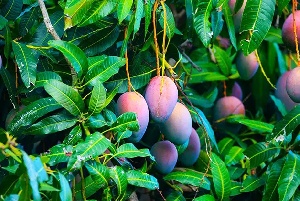Health News of Wednesday, 30 April 2025
Source: www.ghanawebbers.com
Benefits of Mango Leaves
Mango Leaves
Many people know the sweet fruit of the mango tree. However, mango leaves are also edible.
Mango leaves, or *Mangifera indica*, belong to the Anacardiaceae family. They start as reddish-green or purplish-green and darken as they mature.
Traditional medicine uses mango leaf extracts for various diseases. These include diabetes, bronchitis, diarrhea, asthma, scabies, respiratory issues, syphilis, and urinary disorders.
Here are 10 emerging benefits of mango leaves:
Rich in Beneficial Plant Compounds
Mango leaves contain beneficial compounds like polyphenols and terpenoids. Polyphenols have antioxidant and anti-inflammatory properties. They help improve gut bacteria and may prevent obesity, diabetes, heart disease, and cancer. Terpenoids protect cells from free radicals and support vision and immune health. Mango leaves also provide minerals like nitrogen, potassium, phosphorus, iron, sodium, calcium, magnesium, and vitamins A, B, E, and C.
High in Antioxidants
Free radicals from metabolism can cause degenerative diseases. Mango leaves contain phenolics and flavonoids that reduce free radical effects. These antioxidants help prevent cellular damage.
High in Anti-Inflammatory Properties
Chronic inflammation increases the risk of diseases like Alzheimer’s or Parkinson’s. One animal study found that mango leaf extract has anti-inflammatory effects on brain biomarkers.
May Help Fight Diabetes
Animal studies suggest tender mango leaves contain phytochemicals called anthocyanidins. These can help lower high blood sugar levels. The leaves have a compound called 3beta-taraxerol that works with insulin to activate glucose transporters in cells. This may aid conditions like diabetic angiopathy and retinopathy.
Promotes Digestive Health
Drinking mango leaf infusion regularly acts as a stomach tonic. It helps flush out toxins and prevents stomach ailments like ulcers.
May Have Anti-Cancer Properties
Polyphenols in mango leaves offer chemo-preventive effects against cancer types due to their antioxidant properties.
Prevent Weight Gain
Mango leaf extract contains mangiferin which boosts adiponectin levels. Adiponectin helps regulate fat metabolism and sugar levels in the body. Animal studies show it inhibits fat accumulation in tissue cells.
Strengthens Blood Vessels
Mango leaves have hypotensive properties that strengthen blood vessels and treat varicose veins.
Promote Skin Health
The antioxidant properties of mango leaves combat skin aging signs. They increase collagen production and promote wound healing too. Mangiferin may also help treat psoriasis.
Beneficial for Hair
Rich in antioxidants, mango leaves may protect hair follicles from damage while promoting growth.
How to Use Mango Leaves
You can eat fresh mango leaves or make tea by boiling them in water. To prepare tea at home: boil 10-15 fresh mango leaves in about 150 mL of water. Mango leaves are also available as powder or supplements.











